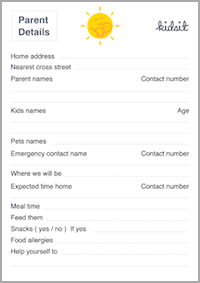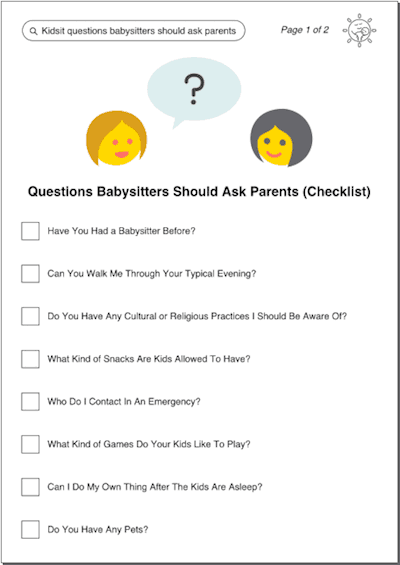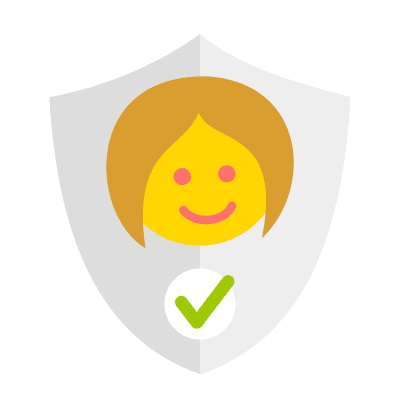What Should Babysitters Ask Parents? (20 Important Questions)


Written & Illustrated by
Matthew James Taylor
Kidsit Founder, General Manager

Reviewed & Edited by
Renee Irving Lee, B.Ed.
Special Education Teacher, Swim Coach, Childrens Author
Key Takeaways
- Understand the Family’s Expectations: Ask if they've had a babysitter before and what they liked or disliked about previous experiences. This helps you align with their expectations and build trust.
- Familiarize Yourself with the Routine: Inquire about the typical evening schedule, including meal times, bedtime routines, and any regular activities. This ensures consistency and comfort for the children.
- Respect Cultural and Religious Practices: Ask if there are any cultural or religious practices you should be aware of, such as dietary restrictions, prayer times, or specific customs.
- Know Emergency Procedures: Ensure you have emergency contact information, including who to contact in case of an emergency and the location of the first aid kit.
- Clarify Responsibilities: Discuss additional tasks you might be expected to handle, such as helping with homework, light housework, or pet care.
- Establish Communication Preferences: Determine how the family prefers to communicate during your babysitting session, whether through phone calls, texts, or in-person check-ins.
- Understand Child Preferences and Needs: Ask about the children's favorite games, snacks, and any specific fears or habits they may have.
- Set Boundaries and Expectations: Clarify rules regarding screen time, bedtime, and other household guidelines to ensure consistency and respect for the family's rules.
Whether you're at a babysitter interview or the parents are about to leave you alone with their children for the night, it's always better to ask more questions than not enough.
Questions babysitters should ask parents:
- Have you had a babysitter before?
- What kind of snacks are the children allowed to have?
- Who do I contact In an emergency?
- What kind of games do your children like to play?
- Do you have a first aid kit?
- What other tasks do you expect of me?
- Do the children have any chores?
- Are there rules about screen time?
- Do you have any questions for me?
In this article, I'll walk you through a list of questions that every babysitter should ask parents. Asking these questions in advance can help to avoid some unnecessary difficulties or misunderstandings.
1. Have You Had a Babysitter Before?
It's good to find out if a family has worked with a babysitter previously.
If it's the first time the parents have ever left their child alone with a sitter, they might be a bit more anxious about the entire process and need some extra reassurance. They could also have some unrealistic expectations or beliefs about babysitters since they've never worked with one before.
If a family has used a babysitter before, it's useful to ask what sorts of things they liked and disliked about their previous babysitter. This will give you some clear ideas to focus on, and potential areas to avoid. You don't necessarily want to gossip about all their past sitters for a long time, but it's good to get a few insights.
This conversation will tell you what is important to your employer and what kind of expectations they have for you. For example, if their biggest complaint was that their last sitter was always showing up late, make sure that punctuality is a priority for you.
If a family has hired tons of babysitters before but none of them really stuck around, this could possibly be a potential red flag for you. If you hear this during an interview and you get the feeling that the parents might not be reasonable, you may want to skip that particular job. It may mean that the parents have unreasonable expectations, or it could be that they just had a string of bad luck with past babysitters. So it's important to trust your gut in this case.
2. Can You Walk Me Through Your Typical Evening?
Ask the parent to walk you through what their typical evening would look like, or the average weekend or day, depending on exactly what timeframe you'll be babysitting during.
Ask about their usual routines, who the children normally interact with, and any other important details.
Understanding how the children spend their time, will help you to better plan and structure your babysitting time with them. If you can match their usual routine, it will probably cause less upheaval than throwing them into a brand new schedule.
These questions can also help establish whether you are a good match with the family or not. If the child you'll be babysitting does three hours of loud piano practice every Saturday night when you'll be watching them and you don't think you can handle that, now is a good time to find out. Particularly if they're just learning as it won't exactly be music to your ears!
You don't have to act like an exact clone of the parent you're babysitting for and follow their routine exactly. But keeping it pretty close will help build trust and make the child feel more safe and secure, especially in the beginning. Of course, it's great to mix in a few fun activities that the child only gets to do with you as a babysitter as well!
3. Do You Have Any Cultural or Religious Practices I Should Be Aware Of?
Nowadays we live in a multicultural society more than ever before. So it's important to be sensitive to a family's religion or culture while babysitting for them and be aware that some families may have different beliefs than your own.
Families may have all kinds of different customs that they would prefer you to follow when you're in their home.
It could include things like taking your shoes off before you enter their home, abstaining from certain foods, covering up tattoos and removing piercings, not celebrating certain holidays, facilitating their children praying before meals, at bedtime, or other times of the day, and lots more.
It's not always obvious whether a particular family has different religious or cultural beliefs from you. So it's best to ask this question of every new family that you babysit for, just for the sake of sensitivity to their particular situation.
4. What Kind of Snacks Are the Children Allowed To Have?
The children you're babysitting might try and convince you that they're allowed to eat cookies at 9 pm. But unless you ask their parents beforehand you can never be 100% sure they are telling the truth! That way you won't have to second-guess yourself when kids throw out crazy suggestions on what they can eat.
Ask parents ahead of time what their children can and can't have. Also ask about any restrictions before bed, as there are probably some foods they aren't allowed to eat for an hour or two before they go to sleep. Particularly sugary foods or drinks with caffeine that will keep them awake and full of energy.
5. Who Do I Contact In An Emergency?
Before parents leave for the night, you should have a list of phone numbers and resources in case of any kind of emergency. You should have the phone numbers for parents, as well as family members and friends, your local poison control number, and other emergency numbers that you need to have handy in case the worst happens.

Parent Details (Form)
When arriving at a babysitting job, ask the parents to fill out their details in this handy form so all their contact information, plus important details about the children, is in one place.
Put it on the fridge or kitchen table so you know exactly where it is in an emergency. After the job, keep it in your babysitting binder for future jobs with the family.
(parent-details-form-v2.pdf 36kb)
6. What Kind of Games Do Your Children Like To Play?
If you're going to be playing with the children all day, it's good to get an idea of what some of their favorite activities and games are. Particularly if they're too young to answer for themselves.
Ask parents what their children like to do in their spare time. What are their favorite books, toys, and activities?e. You might also want to ask if they have imaginary friends and what neighborhood children they are allowed to play with and when?
Asking in advance means you won't have to use trial and error to figure out what the children want to do or who they can play with after their parents have left.
Need some new game ideas? Read my article Fun Things To Do While Babysitting, which has over 205 games and activities.
7. Can I Do My Own Thing After The Children Are Asleep?
Once the children you're babysitting have gone to bed, you might want to catch up on some homework, text your friends, or just watch some television.
Usually, parents are fine with this as long as you're still checking on their children once and a while. But it's a good idea to get explicit permission first.
This is a good segway into asking a family for permission to use their wifi and what their password is. Some families might not be comfortable sharing their wifi with you and you should respect that, but it also doesn't hurt to ask.
Are you struggling to get children to bed? See my article How to get children to bed when babysitting.
8. Do You Have Any Pets?
You should be aware of any pets that a family has. Even if they don't have a dog or cat that might need attention or to be let outside, you should know whether the family has a snake or hamster in case it escapes!
If you're allergic to pet hair, it's good to know in advance so that you can take an antihistamine before you go to babysit.
Have a phobia of certain kinds of pets? You should discuss with parents in advance to see if they can confine them to one room that you don't need to go into.
9. What Do I Do In Case of a Power Outage?
It's good to ask if the family has a flashlight that you can use in case of a power outage, and where it's located. It's not that uncommon for a thunderstorm during the summer to knock out power for a few hours at a time in some places.
You should ask where their fuse box is located and know how to reset it in case of any sort of electrical malfunction if you feel comfortable with doing that. Normally it's as easy as flipping a switch back on. They might also have a backup generator or some other power source.
Worst case scenario, you'll need some kind of battery-powered light source to help kids brush their teeth and put them to bed if it doesn't seem like the electricity will come back on any time soon.
10. Do You Have A First Aid Kit?
All babysitters should be trained in First Aid, but it's not much use if you don't also know where a family keeps their first aid supplies.
Some families may not have a full-blown first aid kit, but you should at least know where they keep basics like band-aids and ice packs in case a child gets hurt.
It's a good idea to keep a miniature first aid kit in your babysitter binder or bag. You can never be too prepared.
At Kidsit we recommend this portable first aid kit, it's not expensive and it's packed with the perfect supplies for babysitting!
If you don't have a babysitting binder yet, check out my article on how to make one and what you should include in it.
When a child is crying and in pain, you want to know exactly where the medical supplies are so that you don't have to start sifting through drawers to find them.
11. What Other Tasks Do You Expect of Me?
Ideally, you should have this conversation during the interview stage with a new family that you're considering babysitting for.
You need to know what kind of tasks they expect of you before you start working for them. Otherwise, how do you know if the job is a good fit for you or not?
They may have specific responsibilities and duties that they had in mind such as cooking meals, washing clothes, helping with homework, or cleaning. Some of these tasks you may not be comfortable with, or you may want increased pay for taking on extra work.
If some of the expected tasks are outside of your comfort zone, it's best to talk about it upfront and come to some kind of agreement beforehand.
Not sure what kind of tasks are reasonable? Check out my article: Should Babysitters Clean?
12. Do The Children Have Any Chores or Responsibilities?
I recommend asking parents about any responsibilities that their children may have. Otherwise, don't be surprised if they try to pass some of their tasks on to you as the babysitter!
A child might be expected to load up the dishwasher after dinner each night. But if you don't know that, you might automatically take on some of their chores without knowing it.
13. Are There Rules About Screen Time?
Most parents will have rules regarding screen time. This includes television, the internet, using tablets or cell phones, and any other types of screens.
Parents might have limits on how much time kids can spend on their devices per day. Or they might enforce a break after kids have been using a device for a certain amount of time, such as a 15-minute break each hour.
Younger children might only be allowed an hour or less of screen time per day, or none at all. And when they can, it's usually only after all of their homework and other tasks for the day are done.
Just like children insisting they're allowed to eat cookies or cake before bed, there will always be that one child who tries to convince you that their parents are fine with them playing video games all night. Check with parents first to avoid any confusion.
14. Do Your Children Have Any Medical Conditions or Allergies?
Allergies to things like nuts, shellfish, bee stings, honey, and plenty of other things are quite common. It can also include certain foods like soy or dairy that you might not think to check ingredient labels for.
Allergic reactions can include everything from a bit of discomfort, all the way to anaphylaxis (or the child's throat swelling shut so they can't breathe.) It's best to treat all allergies as if they are life-threatening. Because even if they aren't, you'll at least end up with an unhappy child if you expose them to something they're allergic to.
If children have severe allergies, they will normally have an Epi-pen in case they have a reaction. Make sure to get parents to explain how to use it.
You should also be aware of any other medical conditions that the children might have, such as hemophilia, epilepsy, asthma, or others. If the children need to take any medication, it's important to know how it's administered and when they have to take it.
15. Do Your Children Have Any Phobias?
It's important to be aware of any fears that children may have. That way you can avoid them, or help put their minds at ease if they're unavoidable. For example, lots of children are afraid of the dark and might want you to help check under the bed or in their closets before they are willing to go to bed. Others are afraid of the dark and may need a night light or special toy to sleep.
Children can be scared of the weirdest things, even things that seem perfectly normal to us when we’re older. As a child, I was terrified of mirrors when it was dark!
16. Do Your Children Have Any Self-Soothing Habits or Calming Toys?
When children are scared, tired, or upset they can develop self-soothing habits or need help to calm down with their favorite teddy or blanket. There are certain habits like thumb sucking, twirling hair or cuddling their Mom’s favorite shirt that can help children calm down quickly. These self-soothing habits or attachment to calming toys are very common for children to have. Depending on the child’s age, some parents might want you to either encourage or discourage this kind of behavior when you see it.
Some children can also have unusual habits that develop seemingly for no reason. It's worth knowing about these behaviors in advance, just so that they don't catch you off-guard or become a cause for concern if they're just normal for that child.
17. Is There Any Homework To Be Done?
This is a good one to ask any time that you're babysitting in the evening on a school night.
Most children have some kind of homework they're expected to do each night. Whether that's reading, doing math, spelling, or practicing a musical instrument.
It's good to take an inventory of what they need to do for the evening in advance. That way you both won’t get into trouble with their parents if it's not done!
If the children you're babysitting have a specific time each night that they sit down to do their schoolwork, it's good to be aware of that routine and try to stick to a similar schedule.
18. How Is Discipline Handled?
Every parent will handle disciplining their child a little bit differently.
There might be specific areas that parents really want you to focus on as well. For example, are they struggling with sharing with other children? Is there a sibling rivalry that they're trying to discourage? Do they want the children to say ‘please’ and ‘thank-you’ more often?
You'll want to know at what point you should intervene with discipline, and what that discipline should entail. Some parents may put their children in a time out, others may use positive discipline, and others may just let their child cry it out. You'll want to find out what parents are comfortable with you using, and stick to it.
You should also be comfortable with the discipline routine as well.Even if parents are okay with spanking their child, babysitters should never physically discipline children.
(Discipline can be handled differently for children of different age groups. Read my article How To Babysit Preschoolers for specific needs, discipline methods, and common mistakes for that age.)
19. How Will We Communicate?
After your babysitting interview, you'll need to establish some way to get in touch. That way parents can reach out to you when they need a babysitter.
Ask parents if they prefer to communicate via phone calls, text, or some other method. It's also worth asking if they would like any periodic updates from you while you're babysitting, just to let them know how things are going. Some parents like updates while others prefer not to be bothered.
It's good to know what type of communication parents expect, and how often they want to be contacted.
20. Do You Have Any Questions For Me?
After you've had a chance to ask parents all of the questions that you want, it's good to offer them the same opportunity.
Letting parents ask you questions can help put their mind at ease and ensure any final nagging issues are resolved. Or it might bring up something you hadn't thought about before.
Have An Idea On Your Preferred Babysitting Rate
As a beginner babysitter, it can be beneficial to reduce your babysitting rate by at least 10% from the average rate in your area. This slightly lower rate will help you to compete with other babysitters, gain new clients, and build up valuable experience. Once you're confident and established, you can increase your hourly rate accordingly.
Average Babysitting Rate Per Hour By Country
(Calculated weekly from our live member data — Updated 16 Feb 2026)
| Country | Avg Rate | -10% |
|---|---|---|
| United States | $16.82 | $15.14 |
| Canada | $18.33 | $16.50 |
| United Kingdom | £11.38 | £10.24 |
| Australia | $26.83 | $24.15 |
| New Zealand | $22.74 | $20.47 |
Babysitting rates vary by region so search for your exact location to get a more precise estimate.
Learn how to negotiate a higher pay and make sure you get the rate you deserve!
Conclusion
Asking questions is a great way to get to know the family you'll be babysitting for a bit better.
Some questions regarding medical conditions or allergies may literally be a matter of life and death! While other things like asking when children typically go to bed will just make your job babysitting a bit easier.
Don't be afraid to ask parents lots of questions. Particularly the first time that you babysit for them. This shows you're taking the job seriously and want to provide great care for their children.

Download our checklist
Take this handy checklist of our top 20 questions to ask parents to your babysitting interviews so you know just what to ask.
(questions-babysitters-should-ask-parents.pdf 49kb)
Also, see our other handy babysitting checklists.

























